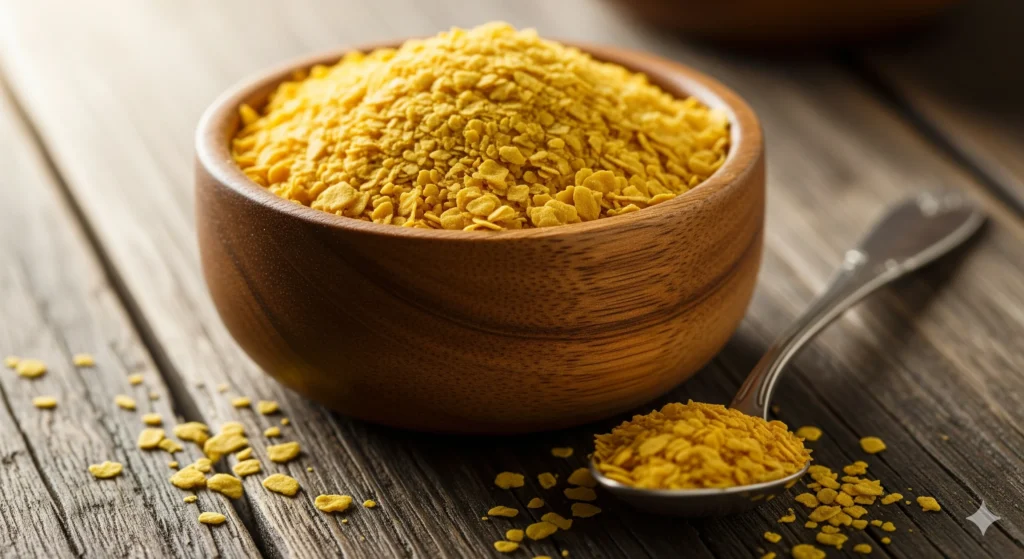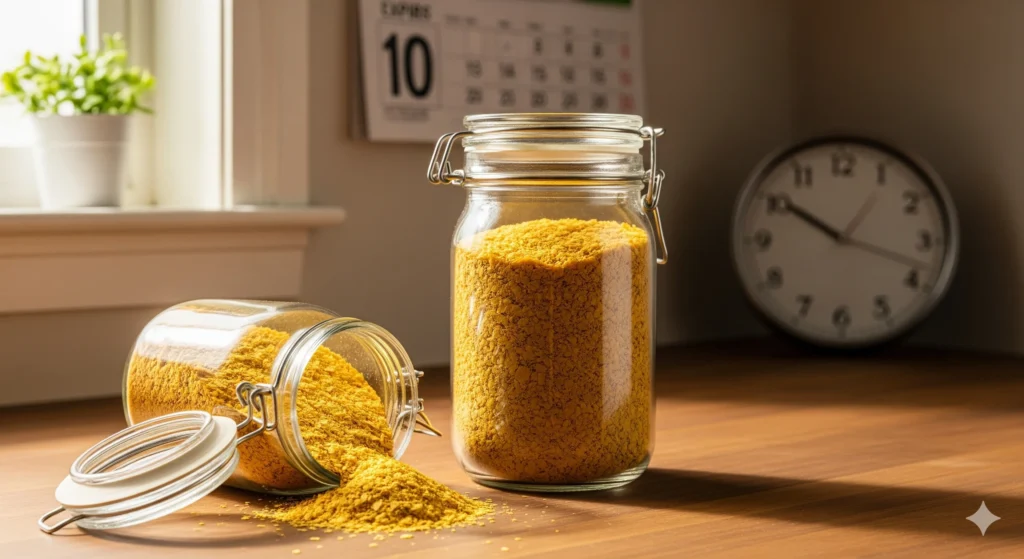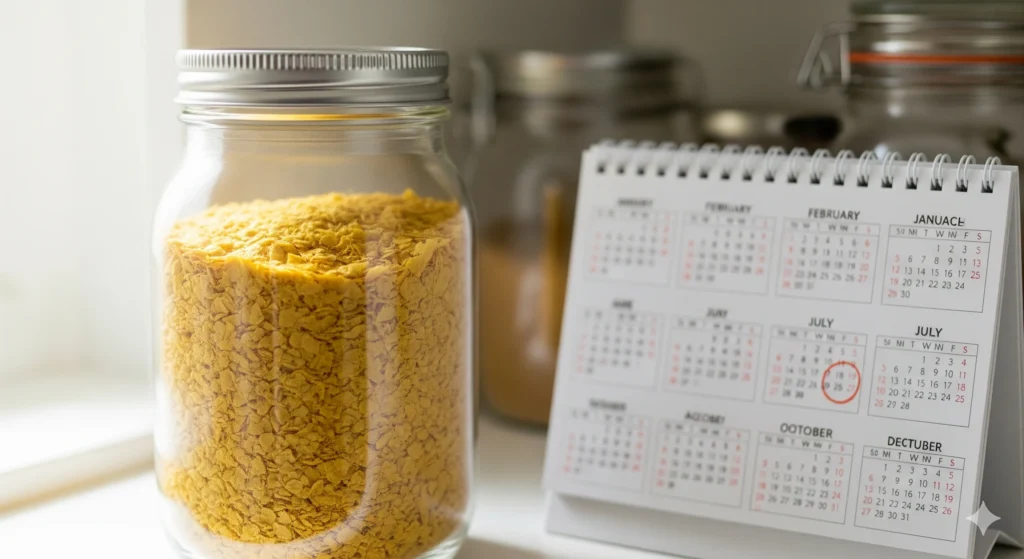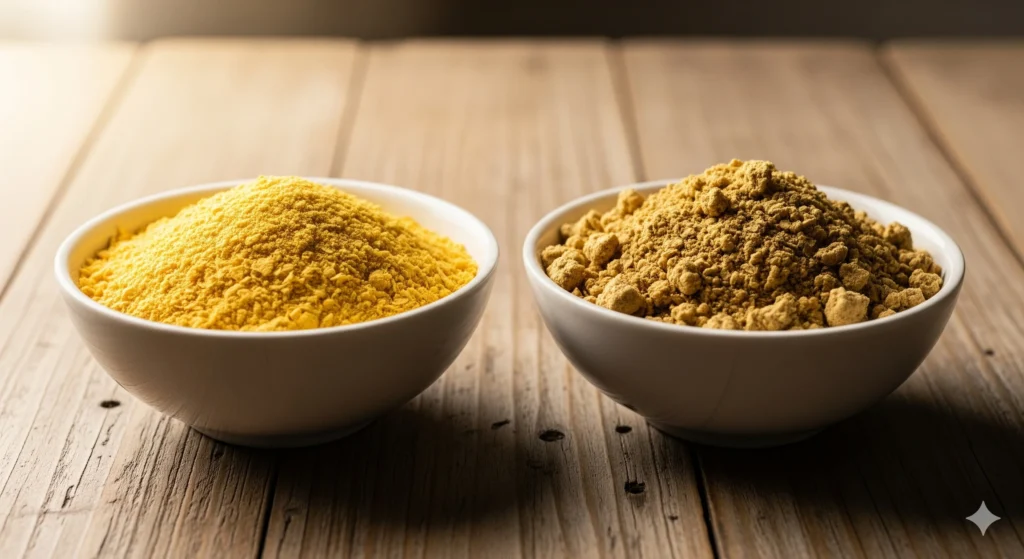Nutritional yeast, popularly known as nooch, is a golden-yellow powder or flake that has become a staple in many kitchens worldwide. Beloved by vegans, vegetarians, and health enthusiasts, this food product is celebrated for its cheesy, nutty, and umami flavor, as well as its impressive nutritional profile.
But like every pantry ingredient, a question arises sooner or later: does nutritional yeast go bad? Can it expire, and if so, how can you tell?
In this in-depth guide, we’ll explore the nutritional yeast shelf life, signs it’s no longer good, proper storage tips, and whether refrigeration is necessary. By the end, you’ll know exactly how to keep your nooch fresh for as long as possible.
What Exactly Is Nutritional Yeast?

Nutritional yeast is made from Saccharomyces cerevisiae, the same species of yeast used in baking and brewing. However, nutritional yeast is deactivated, meaning it won’t cause dough to rise or ferment alcohol.
The process looks like this:
- The yeast is grown on nutrient-rich sources such as molasses or sugarcane.
- It is harvested, pasteurized, and heat-treated to deactivate it.
- Finally, it’s dried and packaged into flakes, granules, or powder.
Nutritional yeast is often fortified with B vitamins, including vitamin B12, which is otherwise rare in plant-based foods. That makes it especially popular among vegans.
According to Healthline (2023), two tablespoons of fortified nutritional yeast can provide:
- 4 grams of protein
- 2 grams of fiber
- 100% of daily vitamin B12 needs (fortified varieties)
- Trace minerals like zinc, selenium, and magnesium
This combination of flavor and nutrition explains why nooch is found in everything from vegan cheese sauces to sprinkled toppings on popcorn and salads.
Does Nutritional Yeast Go Bad?

Yes, nutritional yeast does go bad, though not in the same way as fresh produce or dairy. Instead of rotting or growing dangerous bacteria, its decline is more about quality and nutrition loss.
Here’s what typically happens as nutritional yeast ages:
- Flavor fades: Instead of tasting cheesy, nutty, or savory, it becomes bland or bitter.
- Nutrients decline: Essential vitamins especially B vitamins degrade over time.
- Texture changes: Flakes may clump together if exposed to moisture.
- Aroma alters: A fresh, nutty smell may turn sour or musty.
Unlike perishable foods, expired nutritional yeast is rarely dangerous. However, it becomes less enjoyable and less nutritious.
Nutritional Yeast Shelf Life

The shelf life of nutritional yeast depends on packaging, storage, and whether it’s fortified or not.
Here’s a detailed breakdown:
| Storage Condition | Shelf Life Estimate |
|---|---|
| Unopened, cool pantry | 18–24 months |
| Opened, airtight container (pantry) | 12–18 months |
| Opened, exposed to air/humidity | 6–12 months |
| Refrigerated (airtight jar) | Up to 2 years |
| Freezer storage (airtight, optional) | 2+ years (quality may drop) |
Always check the “best by” date printed on the package. While nooch doesn’t suddenly spoil after this date, it does indicate when the product is at its peak quality, according to USDA guidelines.
How Long Does Nutritional Yeast Last After Opening?
Once you open a package, air, light, and humidity begin to affect its freshness. On average, nutritional yeast lasts one year after opening if stored in an airtight container in a cool, dark place.
If you live in a humid environment, refrigeration may be a smart choice to extend its life.
Does Nutritional Yeast Need to Be Refrigerated?
This is one of the most common questions. The answer is: No, it doesn’t have to be refrigerated, but it can benefit from it depending on your environment.
- Room Temperature Storage: Works fine if kept in a sealed container, away from heat and moisture.
- Refrigerator Storage: Recommended in hot or humid climates to prevent clumping and flavor loss.
- Freezer Storage: Optional for long-term use, though it’s not necessary for most households.
Key Tip: If you buy nutritional yeast in bulk, consider dividing it into small containers and refrigerating one portion while leaving the rest in your pantry.
Signs Your Nutritional Yeast Has Expired

Not sure if your nooch is still good? Look for these warning signs:
- Bland or Off Taste – If it doesn’t deliver the usual cheesy flavor, it’s past its prime.
- Strange Odor – A musty, sour, or stale smell indicates spoilage.
- Clumping – Humidity causes flakes to clump or stick together.
- Color Fading – If the vibrant yellow has dulled, freshness has declined.
- Visible Mold – Rare, but if present, discard immediately.
When in doubt, trust your senses. Taste and smell are the best indicators, as confirmed by Healthline.
Common Storage Mistakes
Many people unintentionally shorten the shelf life of nutritional yeast by making these mistakes:
- Leaving the bag unsealed, allowing air and moisture inside.
- Storing near the stove or oven, where heat degrades nutrients faster.
- Scooping with a wet spoon, introducing moisture.
- Mixing old and new batches together, which can contaminate the fresh one.
Avoiding these errors helps maximize freshness.
Fortified vs. Unfortified Nutritional Yeast: Does It Affect Shelf Life?
There are two main types of nutritional yeast:
- Fortified: Contains added B vitamins (like B12, folic acid, and riboflavin).
- Unfortified: Pure yeast without added nutrients.
While both have similar shelf lives, fortified versions may lose added nutrients faster once opened. According to Medical News Today (2024), vitamin B12 is sensitive to light and heat, which means improper storage reduces its potency more quickly.
Organic vs. Conventional Nutritional Yeast
Does organic nutritional yeast last longer than conventional?
- Shelf life is similar, usually around 1–2 years.
- The main difference lies in production: organic versions are grown without synthetic pesticides or fertilizers.
- Quality and flavor preservation depend more on storage than farming methods.
Is It Safe to Eat Expired Nutritional Yeast?
Generally, yes—it’s not toxic if slightly past its expiration date. But…
- The nutritional value drops.
- The flavor weakens.
- If there’s any mold or strange odor, it should be thrown out.
Think of it like stale cereal: not harmful, but not enjoyable either.
Health Benefits of Nutritional Yeast
While this guide focuses on freshness, it’s worth noting why people love nooch in the first place. According to WebMD (2025), nutritional yeast offers:
- Complete protein: Contains all nine essential amino acids.
- Rich in B vitamins: Especially important for vegans.
- Antioxidants: Compounds like glutathione may help reduce oxidative stress.
- Digestive support: Thanks to its fiber content.
This makes storage even more important you want to preserve these benefits as long as possible.
Final Thoughts
So, does nutritional yeast go bad? Absolutely but only gradually. Unlike perishable foods, nutritional yeast doesn’t spoil quickly. Instead, it loses flavor, texture, and nutrients over time.
When it comes to nutritional yeast shelf life, storing it in an airtight container in a cool, dark pantry can help it last 12–24 months. Refrigeration isn’t required but can be useful in hot or humid areas. If your nooch smells off, tastes bland, or has clumped, it’s time to replace it.
With proper storage, you’ll always have this nutrient-packed, dairy-free flavor booster on hand to sprinkle on popcorn, pasta, soups, and beyond.
FAQs About Nutritional Yeast Expiration
1. Does nutritional yeast go bad?
Yes, it loses flavor and nutrients over time, especially if exposed to air and moisture.
2. How long does nutritional yeast last?
Unopened: up to 2 years. Opened: about 1 year (longer if refrigerated).
3. Can nutritional yeast expire after the “best by” date?
Yes, but it’s usually safe to eat. Quality and nutrition decline, though.
4. Does nutritional yeast need to be refrigerated?
No, but refrigeration extends shelf life in humid climates.
5. Can nutritional yeast mold?
Rarely, but if exposed to moisture, mold growth is possible.
.
Disclaimer: The content on Wellbeingdrive is for informational purposes only and not a substitute for professional advice. Always consult a qualified expert for health concerns.

